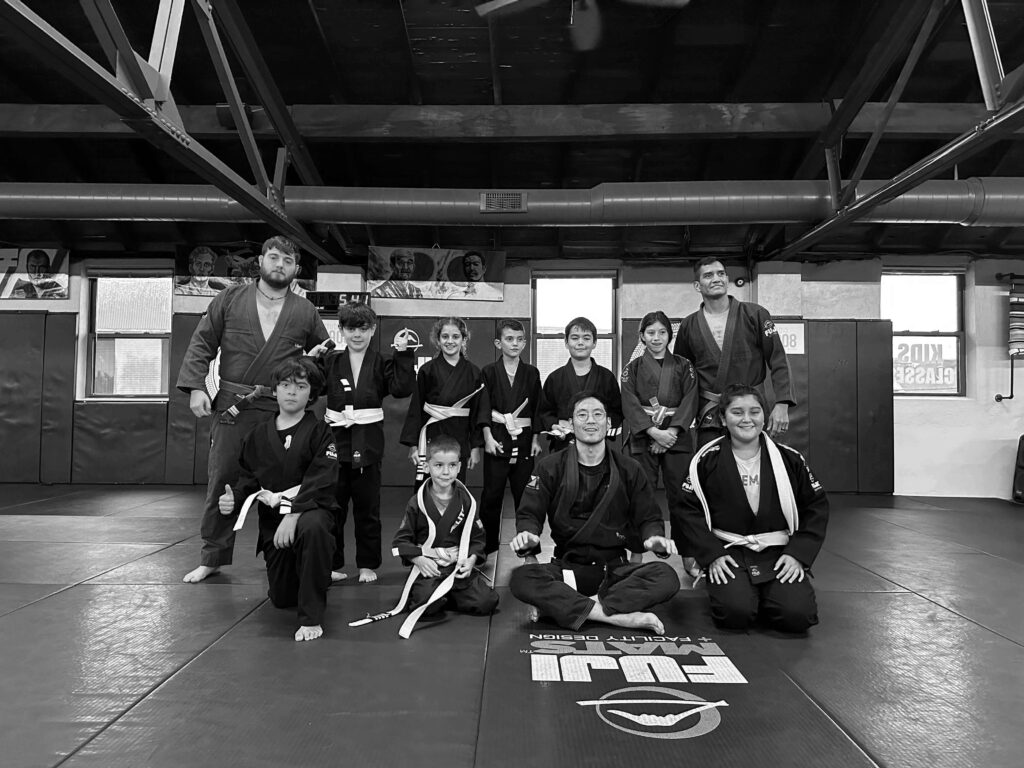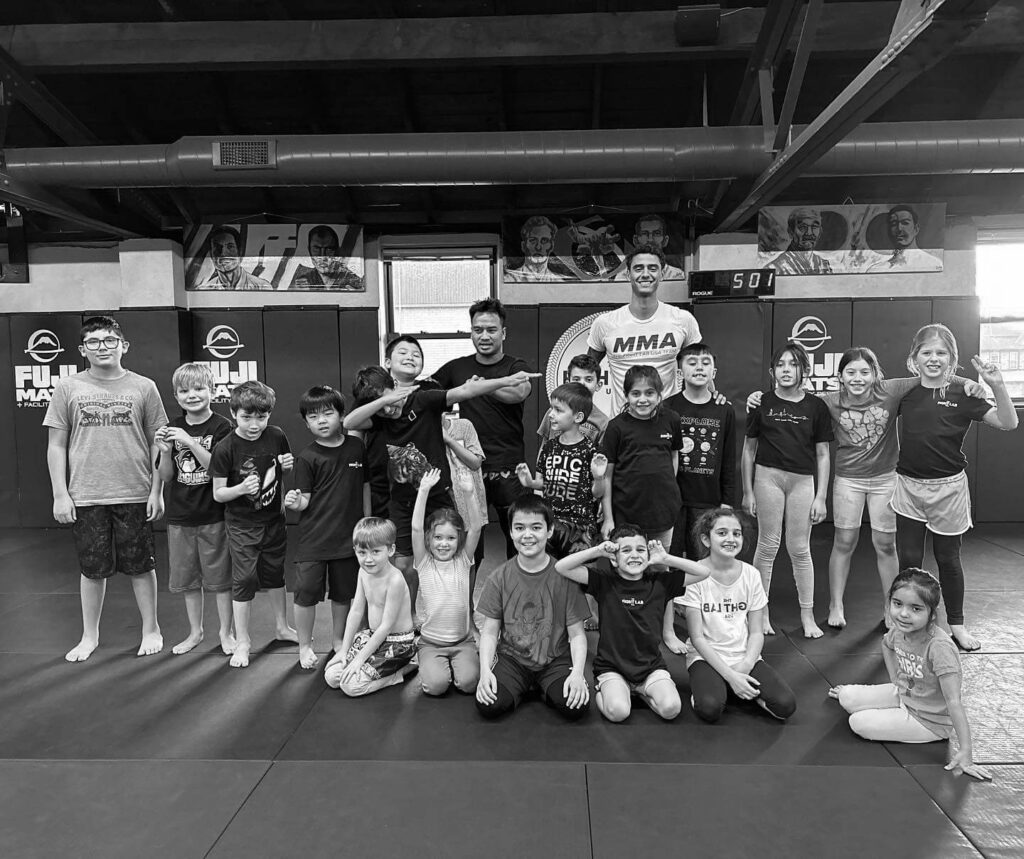
In today’s fast-paced world, where distractions seem omnipresent, the quest to bolster children’s concentration and discipline has become a paramount concern for parents. Brazilian Jiu-Jitsu, a martial art renowned for fostering physical fitness and self-defense skills, has garnered widespread acclaim for its remarkable cognitive benefits, particularly among youngsters. At The Fight Lab USA, we recognize the profound impact of Kids BJJ, not only on physical development but also on the cultivation of vital mental attributes.
This comprehensive guide is dedicated to exploring the cognitive advantages that BJJ offers to children. BJJ’s intricate techniques and strategic elements demand unwavering focus and attention, serving as an effective antidote to the modern era’s attention-draining diversions. Through consistent practice, children learn to analyze situations, make quick decisions, and anticipate opponents’ moves, enhancing their tactical thinking and problem-solving abilities.
Furthermore, BJJ instills discipline by emphasizing structured training, setting goals, and the need for continuous effort to achieve progress. The art’s hierarchical belt system fosters patience, dedication, and humility, qualities that transfer into other aspects of a child’s life.
In essence, Brazilian Jiu-Jitsu emerges as an exceptional tool for nurturing concentration and discipline in children amidst the clamor of contemporary existence. Its fusion of physical prowess and mental acuity provides a holistic approach to shaping focused, disciplined, and adaptable young individuals.
Key Takeaways
- BJJ enhances concentration through focused training and mindfulness.
- Discipline learned in BJJ translates to commitment and resilience in life.
- Cognitive flexibility is nurtured as kids adapt strategies during training.
- BJJ teaches emotional regulation, vital for handling stress.
- Teamwork in BJJ fosters social skills and effective communication.
The Power of Focus: Kids BJJ Sharpens Concentration
Engaging in Brazilian Jiu-Jitsu necessitates a profound degree of focus and mindfulness. Through participation in drills, sparring, and technique refinement, children grasp the art of tuning out diversions and directing their awareness to the current instant. This sharpening of concentration not only benefits their performance within the training arena but also resonates in their scholastic pursuits and day-to-day endeavors.
Scientific inquiry indicates that regular immersion in BJJ augments the neural pathways linked to attention regulation. This phenomenon not only refines their on-mat prowess but also translates into heightened concentration levels across various spheres of a child’s existence. The acquired ability to attune their focus to the task at hand becomes an invaluable asset, bolstering their academic achievements and enabling them to navigate life’s multifaceted demands with enhanced clarity and attentiveness. In a world rife with distractions, the cognitive dividends of BJJ for kids stand as a testament to its enduring efficacy.
Discipline: Cultivating Resilience and Commitment
Cognitive Flexibility: Adapting Strategies in BJJ
Brazilian Jiu-Jitsu is frequently compared to a physical chess match, requiring participants to foresee their adversary’s actions and formulate real-time strategies. This mental dexterity nurtures cognitive flexibility, a pivotal trait that empowers children to acclimate to novel scenarios and engage in astute deliberation. In the dynamic interplay of BJJ, youngsters cultivate the capacity to swiftly adapt and think critically.
Throughout their training, children are prompted to dissect their opponent’s movements and counter with calculated responses. This iterative process of analysis and reaction sharpens their aptitude for problem-solving and hastens their cognitive reflexes. Just as in a chess game, where tactics must be rapidly devised and adapted, BJJ hones the art of quick decision-making amidst uncertainty.
As children continually refine their Brazilian Jiu-Jitsu skills, they inherently bolster their cognitive prowess. This amalgamation of mental agility, strategic reasoning, and adaptable thinking engenders individuals who are not only adept on the mats but also primed to excel in a world that prizes resourceful problem solvers.
Building Confidence and Resilience
In the realm of Kids BJJ, a transformative odyssey of personal advancement unfolds, nurturing burgeoning confidence with every milestone surpassed. As youngsters master intricate techniques and conquer formidable hurdles, a profound sense of achievement takes root, permeating realms far removed from the training mat. This burgeoning self-assurance becomes a wellspring, emboldening them to engage with peers, educators, and authoritative figures with an unwavering self-belief.
Moreover, the indomitable spirit kindled through their Brazilian Jiu-Jitsu journey imparts them with the resilience to confront setbacks head-on and emerge from trials fortified. This resilience, intertwined with newfound confidence, forges a foundation for life’s challenges, cultivating a generation of resilient, self-assured individuals poised to surmount obstacles and flourish in diverse spheres.
Emotional Regulation: Managing Stress and Pressure
Within the structured confines of a Brazilian Jiu-Jitsu gym, children are afforded a secure setting to encounter and navigate stress and pressure. Through participation in sparring sessions and tournaments, they cultivate the capacity to remain composed in high-pressure scenarios, regulate their emotions, and exercise sound judgment with a tranquil mindset. These skills in emotional management hold profound significance, transcending their relevance within the realm of BJJ to profoundly impact other facets of their lives.
The ability to maintain equanimity in intense situations not only elevates their performance within the martial art but also equips them to tackle academic challenges and negotiate intricate social interactions. This transferable aptitude empowers children to face examinations, presentations, and interpersonal relationships with a poised demeanor. The controlled environment of the BJJ gym thus serves as a crucible for nurturing emotional resilience and adeptness, fostering well-rounded individuals who can confront stressors with grace, both on and off the mats.
Teamwork and Social Skills: Building Connections
While Brazilian Jiu-Jitsu is an individual sport, it thrives on a sense of camaraderie and teamwork. Kids practice techniques with partners, learn from each other, and support their teammates’ progress. This collaborative environment nurtures social skills, empathy, and effective communication. As children work together towards mutual goals, they develop the ability to work harmoniously in groups, a skill that extends beyond the gym into school and other activities.

